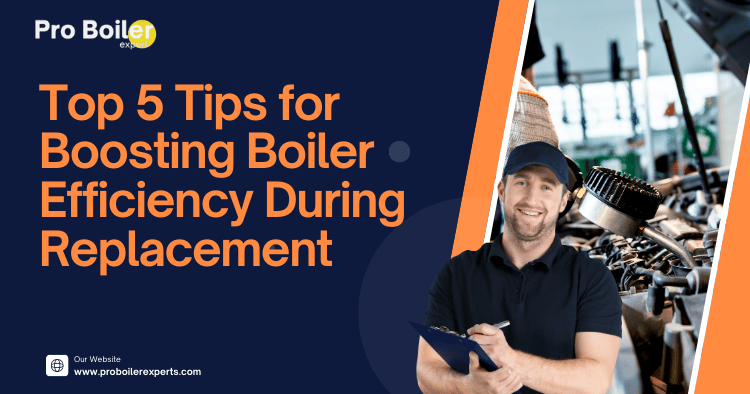Top 5 Tips for Boosting Boiler Efficiency During Replacement
Tip 1
Content for tip 1.
Tip 2
Content for tip 2.
Tip 3
Content for tip 3.
Tip 4
Content for tip 4.
Tip 5
Content for tip 5.
Table of Contents
- Understand Your Home’s Heating Needs
- Choose the Right Boiler Type
- Invest in Modern Technology
- Proper Installation Matters
- Regular Maintenance Post-Installation
Replacing your boiler is not just about selecting a new unit; it’s an opportunity to enhance your home’s energy efficiency. A boiler that operates efficiently can significantly reduce your energy bills and carbon footprint. Here, we’ll explore five essential tips for boosting boiler efficiency during replacement.
1. Understand Your Home’s Heating Needs
Before diving into the replacement process, it’s crucial to assess your home’s heating requirements. Factors such as the size of your home, insulation quality, and existing heating systems play a significant role in determining the right boiler for you.
- Calculate BTU Requirements: BTU (British Thermal Unit) measures the amount of energy needed to heat your space. Use online calculators or consult a heating professional to determine your home’s specific needs based on square footage and insulation levels.
- Evaluate Hot Water Needs: Consider your water usage habits. If you have a large family, you may need a boiler that can provide sufficient hot water without running out.
FAQs:
- How do I calculate BTU needs?
You can use the formula: BTU/hr = (Area to be heated in square feet) x (Desired temperature rise in Fahrenheit) x (0.133).- What if my home has multiple heating zones?
Each zone may require a separate calculation to ensure adequate heating throughout your home.
2. Choose the Right Boiler Type
Boilers come in various types, and selecting the appropriate one can significantly influence efficiency. Here are the main types to consider:
| Boiler Type | Description | Efficiency Rating |
|---|---|---|
| Combi Boiler | Heats water on demand, no storage tank needed | Up to 95% efficient |
| System Boiler | Requires a hot water storage tank | 90-95% efficient |
| Regular Boiler | Uses a separate hot water tank | 80-90% efficient |
- Combi Boilers are ideal for smaller homes, while System Boilers are better suited for larger households with higher hot water demands. Regular Boilers may be less efficient but can work well in homes with existing hot water tanks. For more information, check out Top 5 Benefits of Choosing Combi Boilers for Your Home and Comparison of Boiler Types.
FAQs:
- What’s the difference between a combi and a system boiler?
A combi boiler heats water directly for use, while a system boiler heats water stored in a tank, making it suitable for homes with high hot water needs.- Which type is most efficient?
Combi boilers typically have the highest efficiency ratings due to their on-demand heating capability.
3. Invest in Modern Technology
Boiler technology has advanced significantly, and modern units come equipped with features that enhance efficiency.
- Modulating Burners: These adjust the flame size based on heating demand, ensuring the boiler runs at optimal efficiency.
- Smart Thermostats: They learn your heating preferences and can adjust settings accordingly, reducing energy consumption when you’re away. For the latest in smart technology, see Top 5 Smart Boilers Revolutionizing Home Heating 2024.
- Condensing Technology: This type of boiler captures and reuses exhaust gases, increasing overall efficiency significantly.
FAQs:
- What is a modulating burner?
It is a feature that allows the boiler to adjust its output to match the heating needs, reducing energy waste.- Are smart thermostats worth the investment?
Yes! They can lead to significant energy savings over time, often paying for themselves within a year.
4. Proper Installation Matters
Even the best boiler will underperform if not installed correctly. Here are key considerations:
- Hire a Qualified Installer: Always choose a certified professional to ensure your boiler meets local codes and operates efficiently. Learn more in Top 5 Tips for Choosing the Right Boiler Installer.
- Optimize Boiler Location: The placement of your boiler can affect its efficiency. Ensure it’s in a location that minimizes heat loss and is easily accessible for maintenance.
- Flue and Ventilation: Proper flue installation is essential for efficient operation. Ensure your installer adheres to ventilation standards to prevent dangerous fumes from entering your home.
FAQs:
- Why is professional installation necessary?
Professionals ensure compliance with safety standards, which can prevent costly repairs and hazards in the future.- What are common installation mistakes?
Poor flue installation, incorrect sizing, and improper placement can drastically reduce a boiler’s efficiency and lifespan.
5. Regular Maintenance Post-Installation
Once your new boiler is installed, its efficiency will depend on how well you maintain it.
- Annual Servicing: Schedule yearly check-ups with a professional to ensure optimal performance and address any potential issues before they escalate. For essential maintenance tips, refer to Essential Boiler Maintenance Tips to Keep Your System Efficient.
- Keep an Eye on Pressure Levels: Monitor your boiler’s pressure gauge regularly. An ideal pressure typically hovers around 1.5 bar.
- Bleed Radiators: Regularly bleed your radiators to remove trapped air, ensuring even heating throughout your home.
FAQs:
- What does annual servicing include?
A professional will inspect various components, clean the system, check for leaks, and ensure efficiency.- How can I tell if my boiler needs maintenance?
Look for irregular noises, fluctuating temperature, or increased energy bills, which may indicate maintenance is needed.
By following these five tips for boosting boiler efficiency during replacement, you can enjoy a more comfortable home and lower energy bills. Remember, investing in the right boiler and ensuring proper installation and maintenance can pay off significantly in the long run. For more information on energy-efficient heating solutions, visit Energy.gov.
Happy heating!
Sure! Please provide the Markdown content that you would like to convert to HTML.





